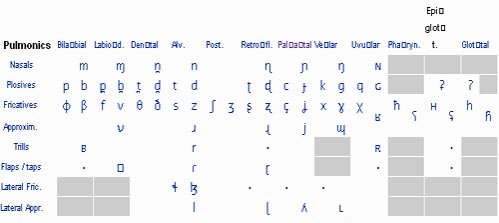 |
 |
 |
| Home | More Articles | Join as a Member! | Post Your Job - Free! | All Translation Agencies |
|
|||||||
|
|
Uvular consonant
Uvulars are consonants articulated with the back of the tongue against or near the uvula, that is, further back in the mouth than velar consonants. Uvulars may be plosives, fricatives, nasal stops, trills, or approximants, though the IPA does not provide a separate symbol for the approximant, and the symbol for the voiced fricative is used instead. Uvular affricates can certainly be made but are rare: they occur in some southern High-German dialects, as well as in a few African and Native American languages. (Ejective uvular affricates occur in as realizations of uvular stops in Lillooet and Georgian.) The uvular consonants identified by the International Phonetic Alphabet are:
English has no uvular consonants, and they are unknown in the indigenous languages of Australia and the Pacific. Uvular consonants are however found in many African and Middle-Eastern languages, most notably Arabic, and in Native American languages. In parts of the Caucasus mountains and northwestern North America, nearly every language has uvular stops and fricatives. Two uvular Rs are found in north-western Europe, where they spread from northern French. The voiceless uvular plosive is transcribed as [q] in both the IPA and SAMPA. It is pronounced somewhat like the voiceless velar plosive [k], but with the middle of the tongue further back, against the uvula rather than the velum. The most familiar use will doubtless be in the transliteration of Arabic place names such as Qatar and Iraq into English, though, since English lacks this sound, this is generally pronounced as the most similar sound that occurs in English, [k]. [ɢ], the voiced equivalent of [q], is much rarer. It is like the voiced velar plosive [g], but articulated in the same uvular position as [q]. Few languages use this sound, but it is found in some varieties of Persian and in several Northeast Caucasian languages, notably Tabasaran. The voiceless uvular fricative [χ] is similar to the voiceless velar fricative [x], except that it is articulated on the uvula. It is found instead of [x] in some dialects of German and Arabic. Uvular flaps have been reported for Kube (Trans-New Guinea) and for the variety of Khmer spoken in Battambang. The Tlingit language of the Alaskan Panhandle has ten uvular consonants:
and the Ubykh language of Turkey has 20. Uvular RhoticsThe uvular trill [ʀ] is used in certain dialects (especially those associated with European capitals) of French, German, Dutch, Portuguese, Swedish and Norwegian, as well as Hebrew, for the rhotic phoneme. In many of these it has a uvular fricative (either voiced [ʁ] or voiceless [χ]) as an allophone when it follows one of the voiceless stops /p/, /t/, or /k/ at the end of a word, as in maître [mɛtχ], or even a uvular approximant. As with most trills, uvular trills are often reduced to a single contact, especially between vowels. Unlike other uvular consonants, the uvular trill is articulated without a retraction of the tongue, and therefore doesn't lower neighboring high vowels the way uvular stops commonly do. Several other languages, including Inuktitut, Abkhaz and some varieties of Arabic, have a voiced uvular fricative but do not treat it as a rhotic consonant. In Lakhota the uvular trill is an allophone of the voiced uvular fricative before /i/. See alsoReferences

This table contains phonetic
information in IPA,
which may not display correctly in some browsers.
Published - November 2008 Information from Wikipedia
is available under the terms of the GNU Free Documentation
License
E-mail this article to your colleague! Need more translation jobs? Click here! Translation agencies are welcome to register here - Free! Freelance translators are welcome to register here - Free! |
|
||||||||||||||||||||||||||||||||||||||||||||||||||||||||||||||||||||||||||||||||||||||||||||||||||||||
|
Legal Disclaimer Site Map |